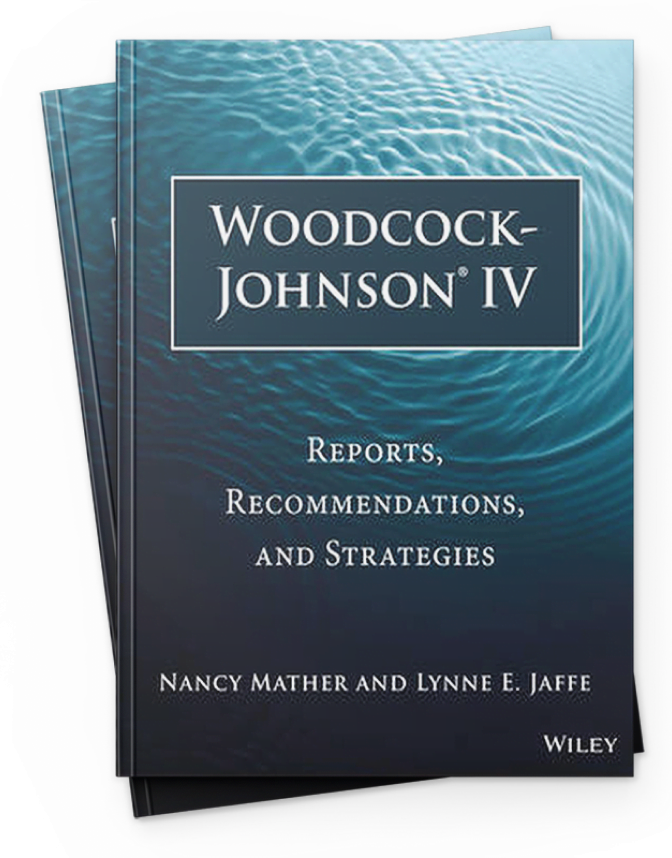
Woodcock Johnson Fourth Edition – Australasian Adaptation [WJ-IV]
The most trusted, in-depth measure of strengths and weaknesses. The only assessment that offers three co-normed batteries that can be administered individually or in combination to produce actionable insights for specific referral concerns.
For ages: 2 – 90+
Format: Combination of interview/Paper-and-Pencil format. PC Based Software for scoring & reporting.
Scoring: Computer Scored
Authors: Dr. Fredrick A. Schrank, Dr. Kevin S. McGrew, Dr. Nancy Mather, Dr. Richard W. Woodcock, Barbara Wendling
UPGRADE KITS are to upgrade your WJ III Cognitive and/or Achievement Batteries to the WJ IV Australasian Adaptation Batteries. Those kits do NOT include any binders or carry bags/suitcases for the Cognitive and Achievement Batteries. Contact PAA for pricing.
Combination Kits
Click to browse products
Single Batteries Kits
Click to browse products
Printed Forms & Handscoring Materials
Test forms, response booklets and scoring reference manuals.
WJ IV Combo (Ach & OL) Kit (Australasian Adaptation)
WJ IV Complete (Cog & Ach) Kit (Australasian Adaptation)
WJ IV Complete Pack (Cog, Ach & WIIIP) Kit (Australasian Adaptation)
WJ IV Comprehensive (Cog, Ach & OL) Kit (Australasian Adaptation)
WJ IV School Combo (Ach, OL & WIIIP) Kit (Australasian Adaptation)
WJ IV Achievement Battery – Form C (Australasian Adaptation)
WJ IV Cognitive Battery (Australasian Adaptation)
WJ IV ECAD KIT
WJ IV Interpretation & Instructional Interventions Program (WIIIP) Kit
WJ IV Oral Language Battery (Australasian Adaptation)
WJ IV Achievement (Form C) Subject Response Booklet (pack of 25) (Australasian Adaptation)
WJ IV Achievement (Form C) Test Record Form (pack of 25) (Australasian Adaptation)
WJ IV Cognitive Subject Response Booklet (pack of 25) (Australasian Adaptation)
WJ IV Cognitive Test Record Form (pack of 25) (Australasian Adaptation)
WJ IV ECAD Record & Response Worksheets with Individual Score Report (25)
WJ IV Oral Language Test Record Form (pack of 25) (Australasian Adaptation)
You are looking at the most trusted, ground-breaking leader in individually administered assessments;
The Woodcock Johnson Fourth Edition (WJ IV) Australasian Adaptation
WJ IV comprehensive system offers the ease of use and flexibility examiners need to accurately evaluate learning problems and improve outcomes for children and adults in a way that no other assessment can.
Features
- Australian norms (Standard Batteries)
- Updated and expanded interpretive model
- New domain-specific scholastic aptitude clusters that allow for efficient and valid predictions of academic achievement
- WJ IV Australasian Adaptation Scoring Software (PC only) allows examiners to easily enter raw scores, assessment data, and test session observations for any test in the WJ IV suite of assessments on their computer to quality and easily generate reports.
Benefits
- WJ IV Tests of Oral Language battery supplements the Cognitive and Achievement batteries to provide measures of oral language, phonetic coding, and speed of lexical access for a more comprehensive evaluation of cognitive abilities or achievement
- Patterns of strengths and weaknesses are a readily obtainable component of any evaluation
- Yields a new Gf-Gc Composite for comparison to measures of cognitive processing, oral language and achievement
- Increased diagnostic sensitivity
- Utilises the most diagnostically useful system for current and future assessment needs
- Provides the most efficient use of testing time
- Offers greater administration flexibility and interpretive clarity
- Supports multidisciplinary evaluation with three distinct, independent batteries
- Pinpoints cognitive and language correlates of learning problems, allowing professionals to more accurately target interventions
The WJ IV consists of three independent and co-normed batteries, which may be used separately or in any combination, emphasising the identification of individual strengths and weaknesses by providing comparisons both within each battery and across batteries:
- WJ IV Tests of Cognitive Abilities
- WJ IV Tests of Achievement
- WJ IV Tests of Oral Language
Other Materials:
- WJ IV Early Cognitive and Academic Development (ECAD)
- WJ VI Interpretation and Instructional Interventions Program (WIIIP)
User Level: A
Comprehensive. Flexible. Diagnostically useful.
For Ages: 2 – 90+
Administration Time: 5 minutes per subtest
- Identify exceptionalities and disabilities
- Determine relative cognitive strengths and weaknesses
- Link evaluations data to interventions or accommodations
- Verbal Attention test assess working memory for classroom performance
- Phonological Processing test assess the impact of word access, word fluency, and word flexibility on learning needs
- Visualisation test better measures spatial relationships and mental rotation abilities
- Non-word Repetition test provides an important marker of phonological storage
benefits of tests of cognitive abilities
- Pinpoint cognitive correlates of learning challenges
- Increase diagnostic capabilities by using alongside co-normed Achievement and Oral Language batteries
- Select specific tests for your referral concern with flexible administration design
- Generate an academically predictive Gf Gc composite for comparison to other cognitive abilities, oral language and achievement
- Gather the most robust measure of bread and narrow CHC abilities with diagnostically useful tests and clusters
- Offer greater administration flexibility and interpretive clarity
The fourth edition of the WJ IV Tests of Cognitive Abilities (Australasian Adaptation) supports a new era of Cattell-Horn-Carroll (CHC) theory, containing the greatest breadth of cognitive abilities of any standardised test battery. New tests and clusters have been designed to place emphasis on the most useful measures for identifying an individuals patterns of strengths and weaknesses through seven different broad CHC abilities. This updated and expanded battery provides the most diagnostically useful measures of CHC abilities for contemporary assessment needs.
The WJ IV Tests of Cognitive Abilities also offer a new Gf-Gc Composite for comparison with other cognitive abilities, oral language and achievement. Understanding relative strengths and weaknesses in comparison to the Gf-Gc Composite may lead to individualised instruction designed to target identified learning needs. Plus, all-new working memory, perceptual speed, and phonological processing measures help pinpoint cognitive correlates of learning problems, while a new easy-to-use, intra-cognitive variation procedure allows documentation of cognitive strengths and weaknesses.
Examiners will enjoy administrative flexibility and interpretive clarity with the WJ IV Tests of Cognitive Abilities alone; however, combining administrations of the co-normed WJ IV Tests of Achievement and Tests of Oral Language will increase diagnostic capability and sensitivity.
User Level: C
Determining achievement strengths and weaknesses is now easier than ever!
For Ages: 2 – 90+
Administration Time: 5 minutes per subtest
- Identify academic functioning and growth over time
- Determine relative academic strengths and weaknesses
- Use data to inform educational programming
Benefits of tests of achievement
- Pinpoint all 8 areas of academic functioning related to specific learning disabilities
- Increase diagnostic capabilities by using alongside co-normed Cognitive Abilities and Oral Language batteries
- Compare skills, fluency and application in reading, writing, math and specific combinations
- Select specific tests for your referral concern with flexible administration design
- Use 3 parallel forms to enable reliable pre and post testing
The WJ IV Tests of Achievement (Form C) Australasian Adaptation is ideal for accurately screening, diagnosing and monitoring progress in reading, writing and mathematics achievement areas.
Examiners receive 11 tests in the standard battery. Using the standard battery provides a broad set of scores, while the extended battery allows for more in-depth diagnostic assessment of specific strengths and weaknesses. The selective testing feature of the WJ IV offers examiners the option to only administer the specific tests relevant to any referral questions. As a result, an examiner seldom needs to administer all of the tests or complete all of the interpretive options for a single person.
An examiner has access to an easy-to-use test and cluster comparison procedures allowing them identification of achievement strengths and weaknesses. Two-test Reading, Mathematics, and Written Language clusters provide standard skill development measures without speed requirements. Oral Reading, Reading Speed, and Reading Comprehension tests provide diagnostically useful measures that are necessary for the evaluation of reading performance. Number Matrices test adds a richer, in-depth interpretation of maths problem-solving ability. Variation procedures allow for comparison of fluency to basic skills and applications – an important diagnostic marker. Qualitative checklists for each test in the Standard Battery provide important information that is critical to understanding student performance. Updated and expanded Science, Social Studies, and Humanities tests can be compared to academic achievement. Increased diagnostic capability with measures of phonetic coding and speed of lexical access is a great benefit when used with the WJ IV Tests of Oral Language. Reading Fluency and Reading Rate clusters provide reliable and comprehensive measures of reading fluency.
User level: M
Perfect supplement to Cognitive and Achievement Batteries.
For Ages: 2 – 90+
Administration Time: 5 minutes per subtest
- Assess Oral Language abilities in English
- Determines English language proficiency
- Compare strengths and weaknesses among oral language and language-related abilities
benefits of tests of oral language
- Important diagnostic supplement to the Tests of Cognitive Abilities and Tests of Achievement.
- Provide important information about phonological and rapid automatic naming skills
- Determine how academic achievement levels compare to oral language comprehension
- Allow for a more complete evaluation of specific learning disabilities, including Dyslexia
- Yield a measure of Cognitive-Academic Language Proficiency (CALP)
- Evaluate the impact of oral language proficiency on cognitive and academic performance
- Compare achievement levels to oral language ability
The WJ IV Tests of Oral Language (Australasian Adaptation) provide important contemporary measures of oral language abilities for diagnostic decision-making utilising patterns of strengths and weaknesses (PSW) as well as providing a measure of Cognitive-Academic Language Proficiency (CALP). It allow for more complete evaluation of specific learning disabilities including dyslexia.
The Oral Language tests may be used to determine and describe an individuals strengths and weaknesses with regard to expressive language. The 9-test battery are presented in a single easel. Segmentation test provides important information about phonological processing. The OL tests increase diagnostic sensitivity with measures of phonetic coding and speed of lexical access.
The Oral Language tests are used to determine if academic achievement is commensurate with, or discrepant from, the ability to comprehend oral language. Identify the cognitive and academic language proficiency of English language learners. Foundational phonological skills like breaking words into parts and blending sounds to make words are measured by WJ IV Oral Language tests. It is easy to evaluate the impact of oral language proficiency on cognitive and academic performance when the Oral Language tests are administered.
Depending on the purpose and extent of the assessment, an examiner can use any of these tests independently or in conjunction with the WJ IV Tests of Cognitive Abilities and/or WJ IV Tests of Achievement. Several of the battery’s tests were derived from the material in the WJ III Tests of Achievement and WJ III Tests of Cognitive Abilities.
User level: A
Maximise early learner insights in minimal time. Ideal tool for evaluating suspected learning difficulties in early childhood.
For Ages: 2.5 years up to 8 years
Administration Time: 1 hour
- Identifies academic functioning and growth over time
- Determines relative academic strengths and weaknesses
- Uses data to inform educational programming and IEPs
benefits of tests of Early Cognitive and Academic Development (ECAD)
- Pinpoint all 8 areas of academic functioning related to specific learning disabilities
- Increase diagnostic capabilities by using alongside co-normed Cognitive Abilities and Oral Language batteries
- Compare skills, fluency, and application in reading, writing, math and specific combinations
- Select specific tests for your referral concern with flexible administration design
The WJ IV Tests of Early Cognitive and Academic Development (ECAD) measures general intellectual ability, early academic skills and oral expression in all children ages 2.5 through to 8 and children with cognitive developmental delays through to 10-year-olds.
10 tests (4 unique and 6 early forms of WJ IV tests) are included in one test easel. With its combination of unique new material and early-form content adapted from trusted WJ IV tests, ECAD provides a dynamic way for examiners to assess emerging cognitive abilities and academic skills in young children and children with cognitive delays using contemporary, theory-based measures.
ECAD’s assessment clusters can be completed individually or in any combination. Plus, some tests provide information applicable to multiple clusters, providing examiners with even more options for test customization.
ECAD offers percent delay, standard deviation delay and months delay scores, helping assessors in many states meet IDEA eligibility requirements.
The ECAD Kit includes:
- ECAD Test Book
- Comprehensive ECAD Manual
- Package of 25 ECAD Test Records and Response Worksheets with Scoring Licenses
Digital Product Notice:
Account Holder: This person will be the primary administrator, IT and implementation contact for WJ IV ECAD Kit in your organization or institution. There may be only one Account Holder.
User level: M
Spend less time writing reports, more time facilitating intervention and program planning!
- Links assessment data to intervention recommendations
- Allows practitioners to focus on interpretation and program planning
- Develops personalised instructional strategies and accommodations based on WJ IV and ECAD test results
Benefits of the Interpretation and Instructional Interventions Program (WIIIP)
- Detailed description of individual performance on each test and cluster
- Qualitative, Developmental, Proficiency, and Peer-Comparison information for each test and cluster
- Evidence-based and formative interventions and accommodations
Report types
- Comprehensive Report
- Provides a narrative overview, table of scores, and, if selected, interventions and checklist information
- Includes optional detailed descriptions of the individual’s performance on all WJ IV tests and clusters
The new Interpretation and Instructional Interventions Program (WIIIP) provides a detailed interpretation of student performance on the WJ IV and offers personalized, evidence-based interventions and strategies based on an examinee’s scores. The new WIIIP expands on the already significant library of previous versions, offering hundreds of new interventions and accommodations not available anywhere else. The interventions and accommodations offered in WIIIP provide actionable steps for schools and practitioners working on problem-solving teams, and can serve as an ideal solution for implementing discrepancy models of Response to Intervention (Rtl) process.
WJ IV Training
PAA offers WJ IV training workshops for organisations/groups. Please contact PAA for further details and pricing.
Sample Reports
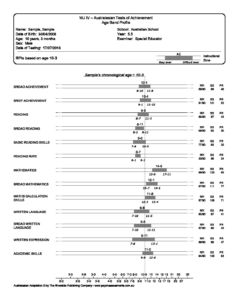 WJ IV ACHIEVEMENT Age Grade Profile Sample
WJ IV ACHIEVEMENT Age Grade Profile Sample![]() Download
Download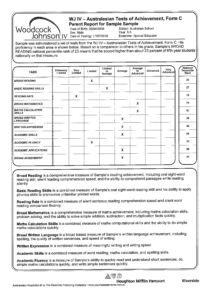 WJ IV ACHIEVEMENT Parent Report Sample
WJ IV ACHIEVEMENT Parent Report Sample![]() Download
Download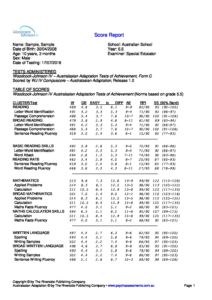 WJ IV ACHIEVEMENT Score Report Sample
WJ IV ACHIEVEMENT Score Report Sample![]() Download
Download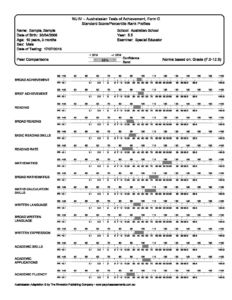 WJ IV ACHIEVEMENT SSPR Profile Sample
WJ IV ACHIEVEMENT SSPR Profile Sample![]() Download
Download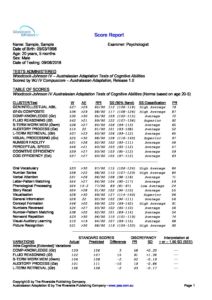 WJ IV COGNITIVE Sample Report (ADULT)
WJ IV COGNITIVE Sample Report (ADULT)![]() Download
Download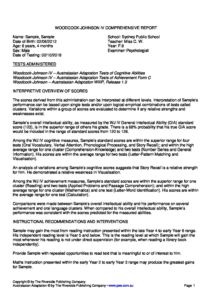 WJ IV Comprehensive Sample Report (COGNITIVE & ACHIEVEMENT)
WJ IV Comprehensive Sample Report (COGNITIVE & ACHIEVEMENT)![]() Download
Download




